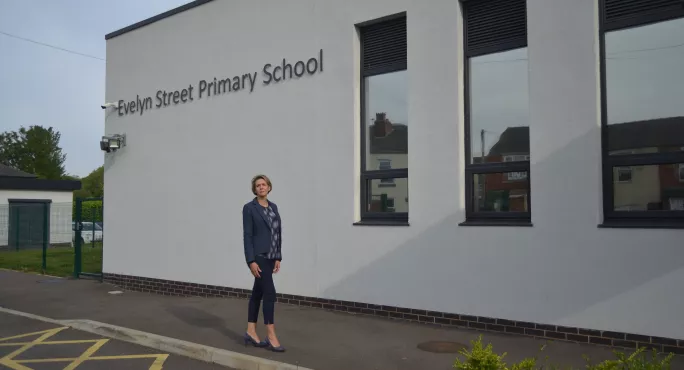
Case study: How to roll out online job interviews

With the latest lockdown still causing shockwaves across the education sector, leadership teams are again adapting to alternative ways of teaching and learning.
Another area schools are having to rethink is recruitment. After all, with staff moving on and positions to fill, this vital part of school life must continue.
Faced with recruiting a possible seven or eight candidates for the coming year, Tes spoke to Louise Smith, chief executive at Warrington Primary Academy Trust, who in March 2020 was looking at digital solutions to replace face-to-face interviews.
As well as needing new staff for her own schools, Smith’s trust is part of the Warrington Teaching School Alliance, so had a raft of job-seeking initial teacher training (ITT) students to think about.
Tech already in place
Smith explains that while the closure of classrooms has ended the chance of face-to-face interviews and lesson observations, digital solutions already in place can be expanded to incorporate the interviewing processes.
“We’re using Microsoft 360 Teams,” Smith explains ahead of her recruitment drive back in April.
“We went with that solution to ensure continuity of our curriculum for our children, and all the multi-academy schools were delivering that, live streaming lessons.
“We thought it’s not actually a great leap of faith to look at that as a way to support our recruitment.”
The virtual interview
Moving from digital lessons to digital job interviews might seem like a natural progression. But Smith admits, just as in a teaching environment, there are things that virtual interviews struggle to replicate. However, she is already looking at ways to mitigate any drawbacks.
“It’s difficult to replicate that connectivity you get in a face-to-face interview, so we’re going to do a couple of interviews,” Smith explains, to help really build a sense of getting to know someone.
Furthermore, she intends to continue conducting panel-type interviews to help gain a range of feedback on candidates.
“You can get a connection with a person, even over the phone, but we’d like to have a number of different people talk to the candidate.
“You can set up Teams with multiple people so we can have a panel interview the candidate. That way, we can try and get a feel for them and also make sure they get a feel for us.”
The live-stream lesson
In a question-and-answer situation, using a tech solution in place of a real-life interview might not seem like a huge problem.
International schools often use video conferencing software to undertake at least the first round of interviews but, when it comes to seeing the candidate teach, things become a little more complicated.
“Obviously, we can interview them and have a conversation with them, but we would also potentially use Teams to live stream a lesson to a selection of our children,” says Smith.
“Another element of what we thought we would do is give them children’s work and ask them ‘what feedback would you give this child? What would the next steps be?’
“We would then give them time to design that lesson, using whatever resources they want to, and then we’d ask them to deliver that lesson online with our children.”
Getting ‘under the skin’ of the candidate
Having been interviewed by multiple people and having completed a live lesson, there is one additional layer that Smith has decided to introduce to her virtual interviews.
“You do lose something when you’re doing an online interview,” she explains. “You don’t get that personality that you get when you’re actually face-to-face with them.”
To overcome this limitation, Smith will ask potential staff to complete a short assessment to better understand their motivations and behaviours.
“Our staff have done something like that where we’ve been able to look at what our different features and characteristics are,” Smith says.
“We’ve all found this very beneficial, in the academy, so that we know how we can get the best out of each other and how people respond when they’re under pressure.”
Smith says there are no right or wrong answers to this but it’s about helping gain a better understanding of what a candidate is like. “When you’re building teams of people, you need to know what their DNA responses are within that team,” she adds.
Putting plans into practice
Having quickly formulated a plan to ensure the trust’s recruitment cycle faced minimal disruption, Smith realised she had the perfect opportunity to test the process.
“We’re going to do a test run with our ITT students,” she explains. “They don’t know it yet.”
Online interview practice “will give them experience so that, if another school wishes to interview them, they’ve been challenged robustly by doing that process”, she says. “They will be well equipped to achieve that job. They’ll probably be better equipped than other teachers currently looking for roles.”
Having added extra layers to the interview process and having a group of keen young trainees on which to conduct a trial, Smith believes this new set-up can work well, noting that, after all, the more traditional face-to-face interview process isn’t foolproof either.
“We’ve employed people who haven’t worked out. No recruitment drive is infallible. There are limitations to this and we accept that. You won’t always get it as right as you want, but we’ll get it as right as we possibly can in the circumstances.”
Louise Smith is chief executive at Warrington Primary Academy Trust, a multi-academy trust consisting of six primary schools and the Warrington Teaching School Alliance
You need a Tes subscription to read this article
Subscribe now to read this article and get other subscriber-only content:
- Unlimited access to all Tes magazine content
- Exclusive subscriber-only stories
- Award-winning email newsletters
- Unlimited access to all Tes magazine content
- Exclusive subscriber-only stories
- Award-winning email newsletters
You need a subscription to read this article
Subscribe now to read this article and get other subscriber-only content, including:
- Unlimited access to all Tes magazine content
- Exclusive subscriber-only stories
- Award-winning email newsletters
- Unlimited access to all Tes magazine content
- Exclusive subscriber-only stories
- Award-winning email newsletters
